Examining Ethical Challenges: Stakeholders and the Market in CSR/ESG
VerifiedAdded on 2023/06/10
|11
|3471
|404
Essay
AI Summary
This essay delves into the ethical issues that arise when stakeholders and the market serve as the sole enforcers of Corporate Social Responsibility (CSR) and Environmental, Social, and Governance (ESG) principles. It analyzes the potential conflicts of interest, lack of transparency, and challenges related to changing demographics and customer perceptions. The essay also examines the importance of regulation in enforcing and monitoring ESG practices, strategic behaviors of corporations in influencing public policy, and the abuse of workers' rights. Furthermore, it highlights the positive effects of disclosure requirements and the role of Carroll's CSR pyramid in promoting ethical and sustainable business practices. The analysis emphasizes the need for businesses to address these ethical concerns to improve their sustainability, brand image, and overall societal impact, with insights available for students on Desklib.

ESSAY
Paraphrase This Document
Need a fresh take? Get an instant paraphrase of this document with our AI Paraphraser
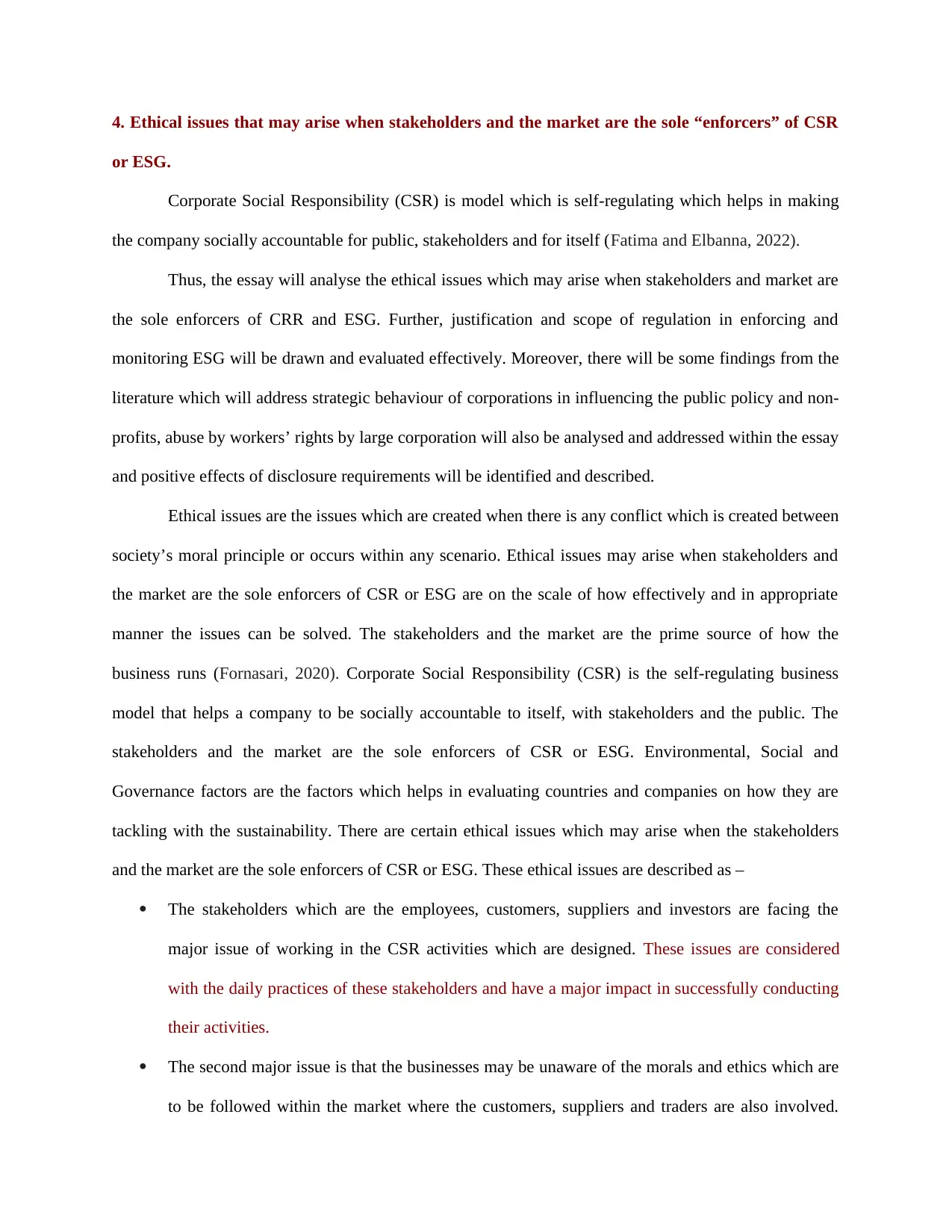
4. Ethical issues that may arise when stakeholders and the market are the sole “enforcers” of CSR
or ESG.
Corporate Social Responsibility (CSR) is model which is self-regulating which helps in making
the company socially accountable for public, stakeholders and for itself (Fatima and Elbanna, 2022).
Thus, the essay will analyse the ethical issues which may arise when stakeholders and market are
the sole enforcers of CRR and ESG. Further, justification and scope of regulation in enforcing and
monitoring ESG will be drawn and evaluated effectively. Moreover, there will be some findings from the
literature which will address strategic behaviour of corporations in influencing the public policy and non-
profits, abuse by workers’ rights by large corporation will also be analysed and addressed within the essay
and positive effects of disclosure requirements will be identified and described.
Ethical issues are the issues which are created when there is any conflict which is created between
society’s moral principle or occurs within any scenario. Ethical issues may arise when stakeholders and
the market are the sole enforcers of CSR or ESG are on the scale of how effectively and in appropriate
manner the issues can be solved. The stakeholders and the market are the prime source of how the
business runs (Fornasari, 2020). Corporate Social Responsibility (CSR) is the self-regulating business
model that helps a company to be socially accountable to itself, with stakeholders and the public. The
stakeholders and the market are the sole enforcers of CSR or ESG. Environmental, Social and
Governance factors are the factors which helps in evaluating countries and companies on how they are
tackling with the sustainability. There are certain ethical issues which may arise when the stakeholders
and the market are the sole enforcers of CSR or ESG. These ethical issues are described as –
The stakeholders which are the employees, customers, suppliers and investors are facing the
major issue of working in the CSR activities which are designed. These issues are considered
with the daily practices of these stakeholders and have a major impact in successfully conducting
their activities.
The second major issue is that the businesses may be unaware of the morals and ethics which are
to be followed within the market where the customers, suppliers and traders are also involved.
or ESG.
Corporate Social Responsibility (CSR) is model which is self-regulating which helps in making
the company socially accountable for public, stakeholders and for itself (Fatima and Elbanna, 2022).
Thus, the essay will analyse the ethical issues which may arise when stakeholders and market are
the sole enforcers of CRR and ESG. Further, justification and scope of regulation in enforcing and
monitoring ESG will be drawn and evaluated effectively. Moreover, there will be some findings from the
literature which will address strategic behaviour of corporations in influencing the public policy and non-
profits, abuse by workers’ rights by large corporation will also be analysed and addressed within the essay
and positive effects of disclosure requirements will be identified and described.
Ethical issues are the issues which are created when there is any conflict which is created between
society’s moral principle or occurs within any scenario. Ethical issues may arise when stakeholders and
the market are the sole enforcers of CSR or ESG are on the scale of how effectively and in appropriate
manner the issues can be solved. The stakeholders and the market are the prime source of how the
business runs (Fornasari, 2020). Corporate Social Responsibility (CSR) is the self-regulating business
model that helps a company to be socially accountable to itself, with stakeholders and the public. The
stakeholders and the market are the sole enforcers of CSR or ESG. Environmental, Social and
Governance factors are the factors which helps in evaluating countries and companies on how they are
tackling with the sustainability. There are certain ethical issues which may arise when the stakeholders
and the market are the sole enforcers of CSR or ESG. These ethical issues are described as –
The stakeholders which are the employees, customers, suppliers and investors are facing the
major issue of working in the CSR activities which are designed. These issues are considered
with the daily practices of these stakeholders and have a major impact in successfully conducting
their activities.
The second major issue is that the businesses may be unaware of the morals and ethics which are
to be followed within the market where the customers, suppliers and traders are also involved.
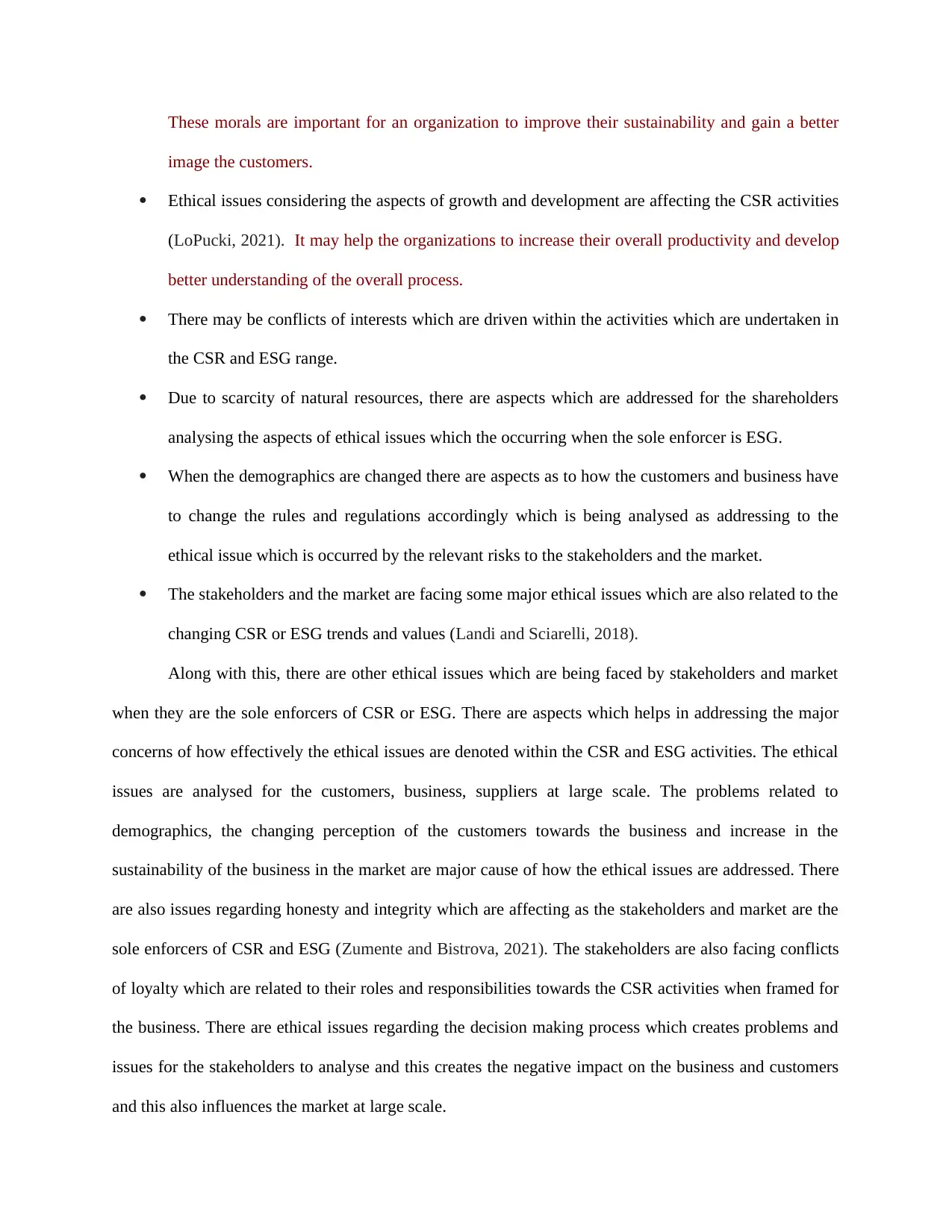
These morals are important for an organization to improve their sustainability and gain a better
image the customers.
Ethical issues considering the aspects of growth and development are affecting the CSR activities
(LoPucki, 2021). It may help the organizations to increase their overall productivity and develop
better understanding of the overall process.
There may be conflicts of interests which are driven within the activities which are undertaken in
the CSR and ESG range.
Due to scarcity of natural resources, there are aspects which are addressed for the shareholders
analysing the aspects of ethical issues which the occurring when the sole enforcer is ESG.
When the demographics are changed there are aspects as to how the customers and business have
to change the rules and regulations accordingly which is being analysed as addressing to the
ethical issue which is occurred by the relevant risks to the stakeholders and the market.
The stakeholders and the market are facing some major ethical issues which are also related to the
changing CSR or ESG trends and values (Landi and Sciarelli, 2018).
Along with this, there are other ethical issues which are being faced by stakeholders and market
when they are the sole enforcers of CSR or ESG. There are aspects which helps in addressing the major
concerns of how effectively the ethical issues are denoted within the CSR and ESG activities. The ethical
issues are analysed for the customers, business, suppliers at large scale. The problems related to
demographics, the changing perception of the customers towards the business and increase in the
sustainability of the business in the market are major cause of how the ethical issues are addressed. There
are also issues regarding honesty and integrity which are affecting as the stakeholders and market are the
sole enforcers of CSR and ESG (Zumente and Bistrova, 2021). The stakeholders are also facing conflicts
of loyalty which are related to their roles and responsibilities towards the CSR activities when framed for
the business. There are ethical issues regarding the decision making process which creates problems and
issues for the stakeholders to analyse and this creates the negative impact on the business and customers
and this also influences the market at large scale.
image the customers.
Ethical issues considering the aspects of growth and development are affecting the CSR activities
(LoPucki, 2021). It may help the organizations to increase their overall productivity and develop
better understanding of the overall process.
There may be conflicts of interests which are driven within the activities which are undertaken in
the CSR and ESG range.
Due to scarcity of natural resources, there are aspects which are addressed for the shareholders
analysing the aspects of ethical issues which the occurring when the sole enforcer is ESG.
When the demographics are changed there are aspects as to how the customers and business have
to change the rules and regulations accordingly which is being analysed as addressing to the
ethical issue which is occurred by the relevant risks to the stakeholders and the market.
The stakeholders and the market are facing some major ethical issues which are also related to the
changing CSR or ESG trends and values (Landi and Sciarelli, 2018).
Along with this, there are other ethical issues which are being faced by stakeholders and market
when they are the sole enforcers of CSR or ESG. There are aspects which helps in addressing the major
concerns of how effectively the ethical issues are denoted within the CSR and ESG activities. The ethical
issues are analysed for the customers, business, suppliers at large scale. The problems related to
demographics, the changing perception of the customers towards the business and increase in the
sustainability of the business in the market are major cause of how the ethical issues are addressed. There
are also issues regarding honesty and integrity which are affecting as the stakeholders and market are the
sole enforcers of CSR and ESG (Zumente and Bistrova, 2021). The stakeholders are also facing conflicts
of loyalty which are related to their roles and responsibilities towards the CSR activities when framed for
the business. There are ethical issues regarding the decision making process which creates problems and
issues for the stakeholders to analyse and this creates the negative impact on the business and customers
and this also influences the market at large scale.
⊘ This is a preview!⊘
Do you want full access?
Subscribe today to unlock all pages.

Trusted by 1+ million students worldwide
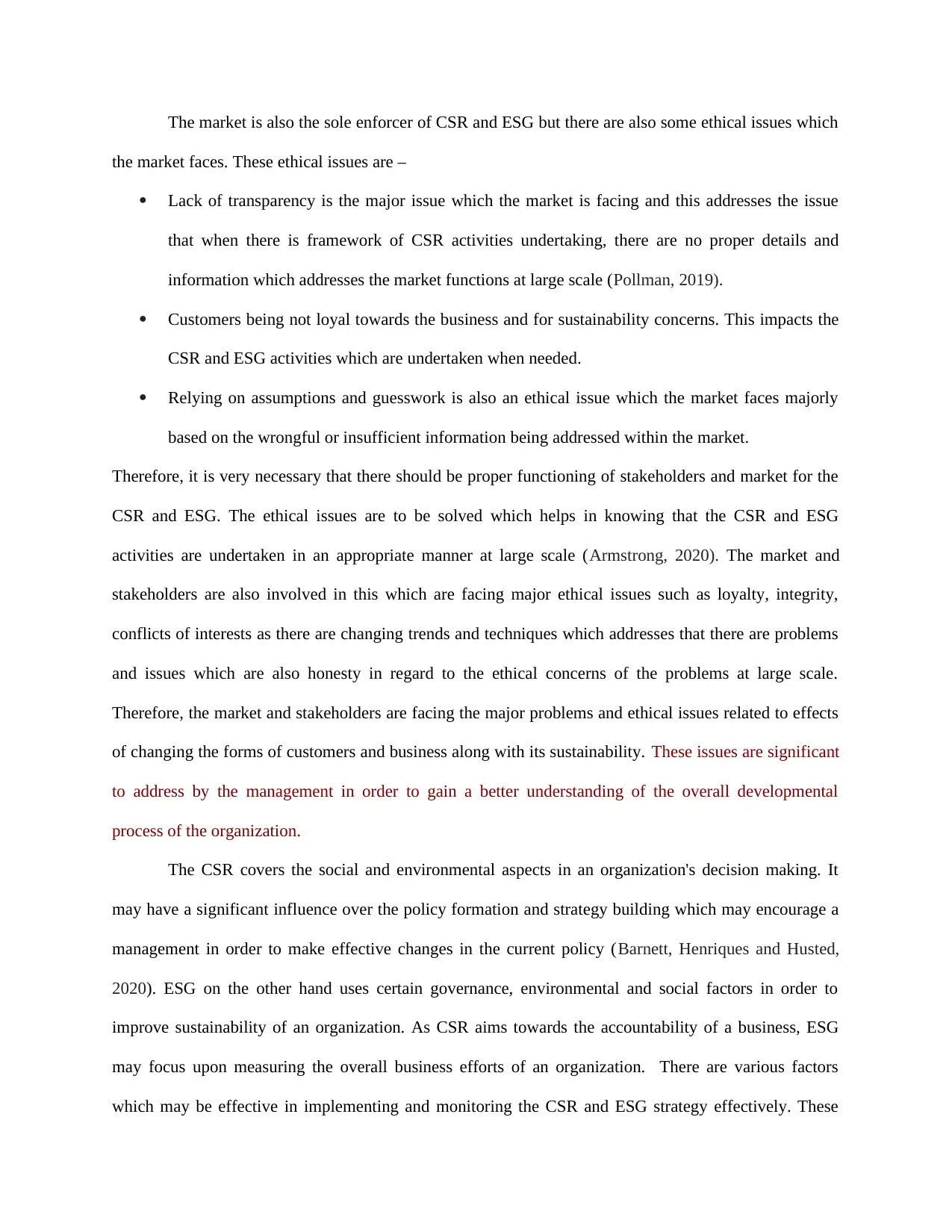
The market is also the sole enforcer of CSR and ESG but there are also some ethical issues which
the market faces. These ethical issues are –
Lack of transparency is the major issue which the market is facing and this addresses the issue
that when there is framework of CSR activities undertaking, there are no proper details and
information which addresses the market functions at large scale (Pollman, 2019).
Customers being not loyal towards the business and for sustainability concerns. This impacts the
CSR and ESG activities which are undertaken when needed.
Relying on assumptions and guesswork is also an ethical issue which the market faces majorly
based on the wrongful or insufficient information being addressed within the market.
Therefore, it is very necessary that there should be proper functioning of stakeholders and market for the
CSR and ESG. The ethical issues are to be solved which helps in knowing that the CSR and ESG
activities are undertaken in an appropriate manner at large scale (Armstrong, 2020). The market and
stakeholders are also involved in this which are facing major ethical issues such as loyalty, integrity,
conflicts of interests as there are changing trends and techniques which addresses that there are problems
and issues which are also honesty in regard to the ethical concerns of the problems at large scale.
Therefore, the market and stakeholders are facing the major problems and ethical issues related to effects
of changing the forms of customers and business along with its sustainability. These issues are significant
to address by the management in order to gain a better understanding of the overall developmental
process of the organization.
The CSR covers the social and environmental aspects in an organization's decision making. It
may have a significant influence over the policy formation and strategy building which may encourage a
management in order to make effective changes in the current policy (Barnett, Henriques and Husted,
2020). ESG on the other hand uses certain governance, environmental and social factors in order to
improve sustainability of an organization. As CSR aims towards the accountability of a business, ESG
may focus upon measuring the overall business efforts of an organization. There are various factors
which may be effective in implementing and monitoring the CSR and ESG strategy effectively. These
the market faces. These ethical issues are –
Lack of transparency is the major issue which the market is facing and this addresses the issue
that when there is framework of CSR activities undertaking, there are no proper details and
information which addresses the market functions at large scale (Pollman, 2019).
Customers being not loyal towards the business and for sustainability concerns. This impacts the
CSR and ESG activities which are undertaken when needed.
Relying on assumptions and guesswork is also an ethical issue which the market faces majorly
based on the wrongful or insufficient information being addressed within the market.
Therefore, it is very necessary that there should be proper functioning of stakeholders and market for the
CSR and ESG. The ethical issues are to be solved which helps in knowing that the CSR and ESG
activities are undertaken in an appropriate manner at large scale (Armstrong, 2020). The market and
stakeholders are also involved in this which are facing major ethical issues such as loyalty, integrity,
conflicts of interests as there are changing trends and techniques which addresses that there are problems
and issues which are also honesty in regard to the ethical concerns of the problems at large scale.
Therefore, the market and stakeholders are facing the major problems and ethical issues related to effects
of changing the forms of customers and business along with its sustainability. These issues are significant
to address by the management in order to gain a better understanding of the overall developmental
process of the organization.
The CSR covers the social and environmental aspects in an organization's decision making. It
may have a significant influence over the policy formation and strategy building which may encourage a
management in order to make effective changes in the current policy (Barnett, Henriques and Husted,
2020). ESG on the other hand uses certain governance, environmental and social factors in order to
improve sustainability of an organization. As CSR aims towards the accountability of a business, ESG
may focus upon measuring the overall business efforts of an organization. There are various factors
which may be effective in implementing and monitoring the CSR and ESG strategy effectively. These
Paraphrase This Document
Need a fresh take? Get an instant paraphrase of this document with our AI Paraphraser
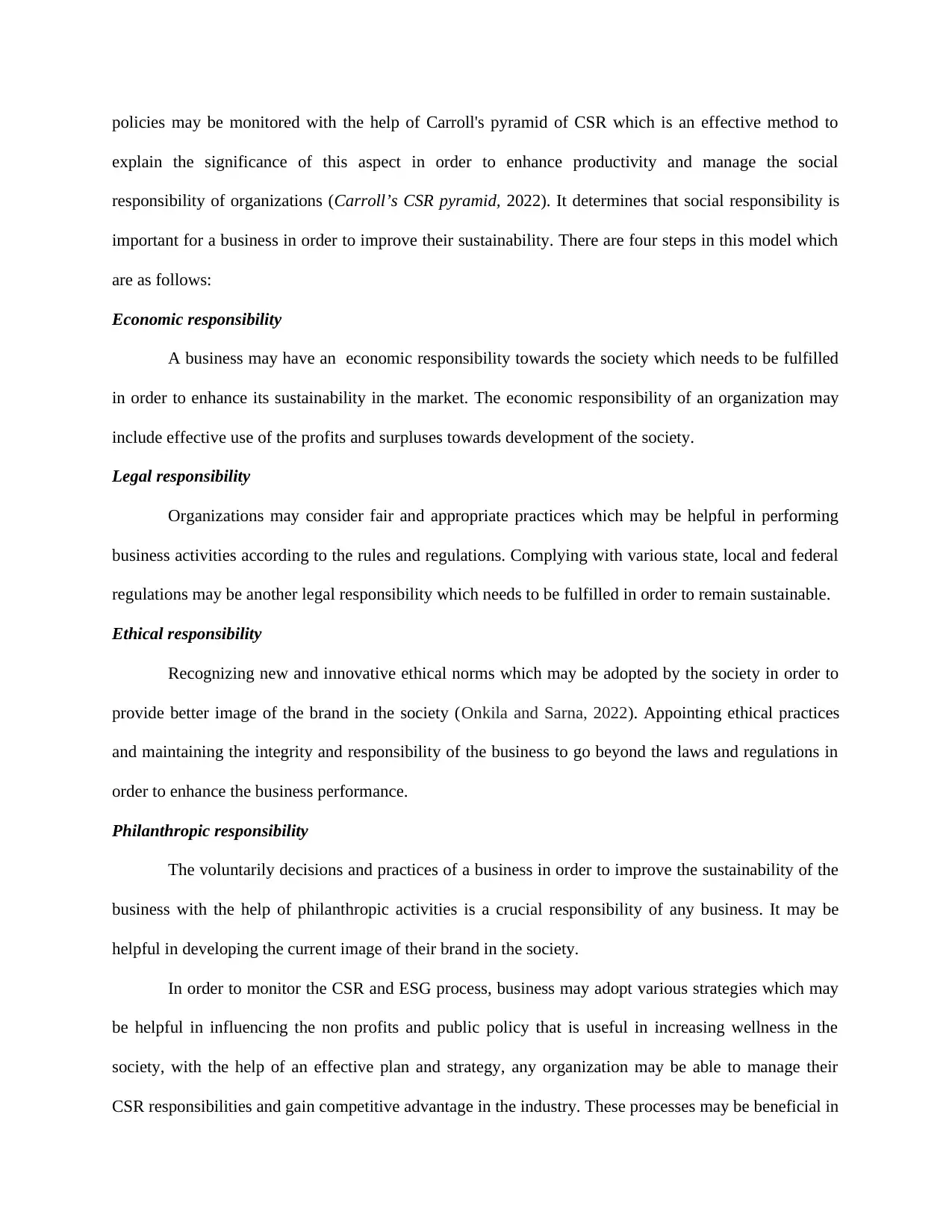
policies may be monitored with the help of Carroll's pyramid of CSR which is an effective method to
explain the significance of this aspect in order to enhance productivity and manage the social
responsibility of organizations (Carroll’s CSR pyramid, 2022). It determines that social responsibility is
important for a business in order to improve their sustainability. There are four steps in this model which
are as follows:
Economic responsibility
A business may have an economic responsibility towards the society which needs to be fulfilled
in order to enhance its sustainability in the market. The economic responsibility of an organization may
include effective use of the profits and surpluses towards development of the society.
Legal responsibility
Organizations may consider fair and appropriate practices which may be helpful in performing
business activities according to the rules and regulations. Complying with various state, local and federal
regulations may be another legal responsibility which needs to be fulfilled in order to remain sustainable.
Ethical responsibility
Recognizing new and innovative ethical norms which may be adopted by the society in order to
provide better image of the brand in the society (Onkila and Sarna, 2022). Appointing ethical practices
and maintaining the integrity and responsibility of the business to go beyond the laws and regulations in
order to enhance the business performance.
Philanthropic responsibility
The voluntarily decisions and practices of a business in order to improve the sustainability of the
business with the help of philanthropic activities is a crucial responsibility of any business. It may be
helpful in developing the current image of their brand in the society.
In order to monitor the CSR and ESG process, business may adopt various strategies which may
be helpful in influencing the non profits and public policy that is useful in increasing wellness in the
society, with the help of an effective plan and strategy, any organization may be able to manage their
CSR responsibilities and gain competitive advantage in the industry. These processes may be beneficial in
explain the significance of this aspect in order to enhance productivity and manage the social
responsibility of organizations (Carroll’s CSR pyramid, 2022). It determines that social responsibility is
important for a business in order to improve their sustainability. There are four steps in this model which
are as follows:
Economic responsibility
A business may have an economic responsibility towards the society which needs to be fulfilled
in order to enhance its sustainability in the market. The economic responsibility of an organization may
include effective use of the profits and surpluses towards development of the society.
Legal responsibility
Organizations may consider fair and appropriate practices which may be helpful in performing
business activities according to the rules and regulations. Complying with various state, local and federal
regulations may be another legal responsibility which needs to be fulfilled in order to remain sustainable.
Ethical responsibility
Recognizing new and innovative ethical norms which may be adopted by the society in order to
provide better image of the brand in the society (Onkila and Sarna, 2022). Appointing ethical practices
and maintaining the integrity and responsibility of the business to go beyond the laws and regulations in
order to enhance the business performance.
Philanthropic responsibility
The voluntarily decisions and practices of a business in order to improve the sustainability of the
business with the help of philanthropic activities is a crucial responsibility of any business. It may be
helpful in developing the current image of their brand in the society.
In order to monitor the CSR and ESG process, business may adopt various strategies which may
be helpful in influencing the non profits and public policy that is useful in increasing wellness in the
society, with the help of an effective plan and strategy, any organization may be able to manage their
CSR responsibilities and gain competitive advantage in the industry. These processes may be beneficial in
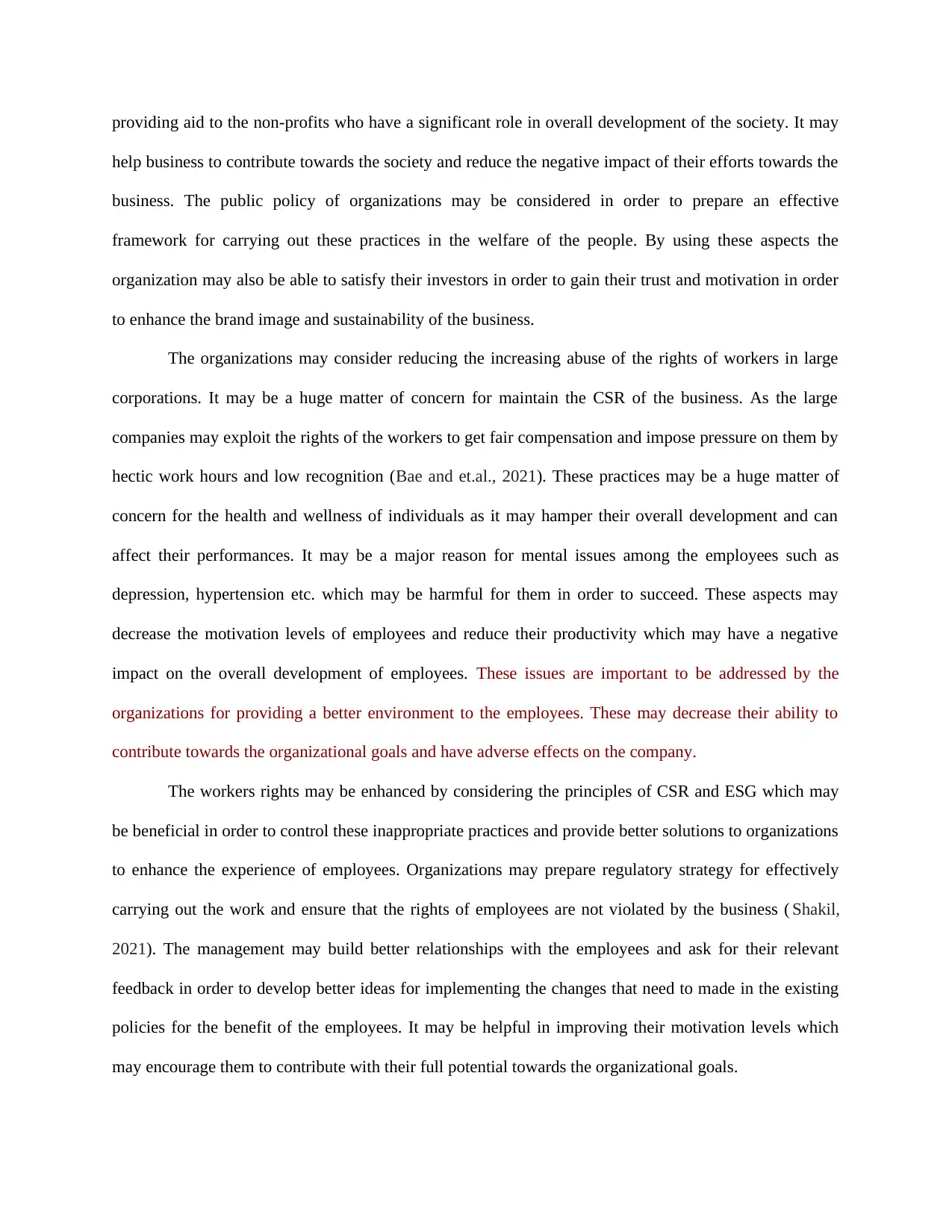
providing aid to the non-profits who have a significant role in overall development of the society. It may
help business to contribute towards the society and reduce the negative impact of their efforts towards the
business. The public policy of organizations may be considered in order to prepare an effective
framework for carrying out these practices in the welfare of the people. By using these aspects the
organization may also be able to satisfy their investors in order to gain their trust and motivation in order
to enhance the brand image and sustainability of the business.
The organizations may consider reducing the increasing abuse of the rights of workers in large
corporations. It may be a huge matter of concern for maintain the CSR of the business. As the large
companies may exploit the rights of the workers to get fair compensation and impose pressure on them by
hectic work hours and low recognition (Bae and et.al., 2021). These practices may be a huge matter of
concern for the health and wellness of individuals as it may hamper their overall development and can
affect their performances. It may be a major reason for mental issues among the employees such as
depression, hypertension etc. which may be harmful for them in order to succeed. These aspects may
decrease the motivation levels of employees and reduce their productivity which may have a negative
impact on the overall development of employees. These issues are important to be addressed by the
organizations for providing a better environment to the employees. These may decrease their ability to
contribute towards the organizational goals and have adverse effects on the company.
The workers rights may be enhanced by considering the principles of CSR and ESG which may
be beneficial in order to control these inappropriate practices and provide better solutions to organizations
to enhance the experience of employees. Organizations may prepare regulatory strategy for effectively
carrying out the work and ensure that the rights of employees are not violated by the business ( Shakil,
2021). The management may build better relationships with the employees and ask for their relevant
feedback in order to develop better ideas for implementing the changes that need to made in the existing
policies for the benefit of the employees. It may be helpful in improving their motivation levels which
may encourage them to contribute with their full potential towards the organizational goals.
help business to contribute towards the society and reduce the negative impact of their efforts towards the
business. The public policy of organizations may be considered in order to prepare an effective
framework for carrying out these practices in the welfare of the people. By using these aspects the
organization may also be able to satisfy their investors in order to gain their trust and motivation in order
to enhance the brand image and sustainability of the business.
The organizations may consider reducing the increasing abuse of the rights of workers in large
corporations. It may be a huge matter of concern for maintain the CSR of the business. As the large
companies may exploit the rights of the workers to get fair compensation and impose pressure on them by
hectic work hours and low recognition (Bae and et.al., 2021). These practices may be a huge matter of
concern for the health and wellness of individuals as it may hamper their overall development and can
affect their performances. It may be a major reason for mental issues among the employees such as
depression, hypertension etc. which may be harmful for them in order to succeed. These aspects may
decrease the motivation levels of employees and reduce their productivity which may have a negative
impact on the overall development of employees. These issues are important to be addressed by the
organizations for providing a better environment to the employees. These may decrease their ability to
contribute towards the organizational goals and have adverse effects on the company.
The workers rights may be enhanced by considering the principles of CSR and ESG which may
be beneficial in order to control these inappropriate practices and provide better solutions to organizations
to enhance the experience of employees. Organizations may prepare regulatory strategy for effectively
carrying out the work and ensure that the rights of employees are not violated by the business ( Shakil,
2021). The management may build better relationships with the employees and ask for their relevant
feedback in order to develop better ideas for implementing the changes that need to made in the existing
policies for the benefit of the employees. It may be helpful in improving their motivation levels which
may encourage them to contribute with their full potential towards the organizational goals.
⊘ This is a preview!⊘
Do you want full access?
Subscribe today to unlock all pages.

Trusted by 1+ million students worldwide
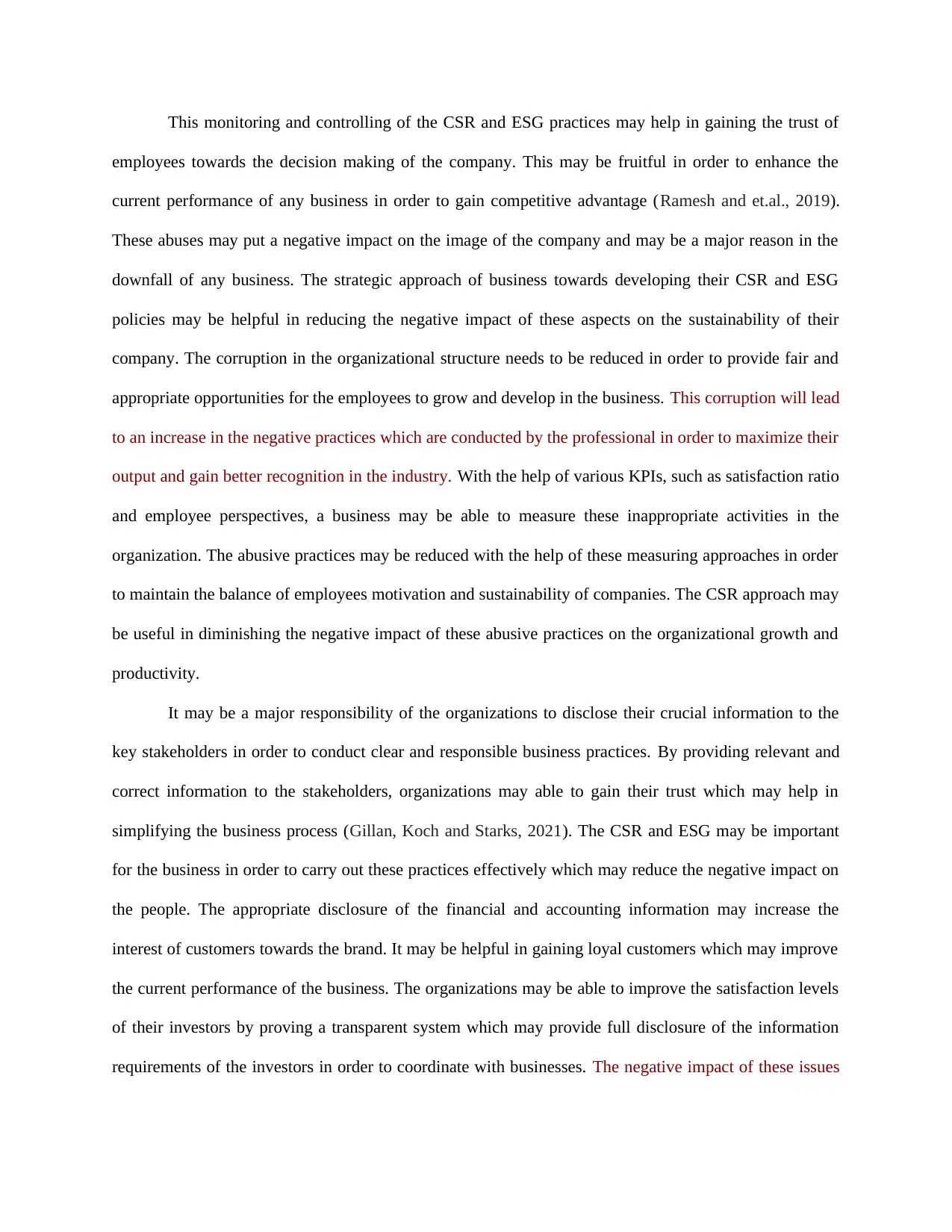
This monitoring and controlling of the CSR and ESG practices may help in gaining the trust of
employees towards the decision making of the company. This may be fruitful in order to enhance the
current performance of any business in order to gain competitive advantage (Ramesh and et.al., 2019).
These abuses may put a negative impact on the image of the company and may be a major reason in the
downfall of any business. The strategic approach of business towards developing their CSR and ESG
policies may be helpful in reducing the negative impact of these aspects on the sustainability of their
company. The corruption in the organizational structure needs to be reduced in order to provide fair and
appropriate opportunities for the employees to grow and develop in the business. This corruption will lead
to an increase in the negative practices which are conducted by the professional in order to maximize their
output and gain better recognition in the industry. With the help of various KPIs, such as satisfaction ratio
and employee perspectives, a business may be able to measure these inappropriate activities in the
organization. The abusive practices may be reduced with the help of these measuring approaches in order
to maintain the balance of employees motivation and sustainability of companies. The CSR approach may
be useful in diminishing the negative impact of these abusive practices on the organizational growth and
productivity.
It may be a major responsibility of the organizations to disclose their crucial information to the
key stakeholders in order to conduct clear and responsible business practices. By providing relevant and
correct information to the stakeholders, organizations may able to gain their trust which may help in
simplifying the business process (Gillan, Koch and Starks, 2021). The CSR and ESG may be important
for the business in order to carry out these practices effectively which may reduce the negative impact on
the people. The appropriate disclosure of the financial and accounting information may increase the
interest of customers towards the brand. It may be helpful in gaining loyal customers which may improve
the current performance of the business. The organizations may be able to improve the satisfaction levels
of their investors by proving a transparent system which may provide full disclosure of the information
requirements of the investors in order to coordinate with businesses. The negative impact of these issues
employees towards the decision making of the company. This may be fruitful in order to enhance the
current performance of any business in order to gain competitive advantage (Ramesh and et.al., 2019).
These abuses may put a negative impact on the image of the company and may be a major reason in the
downfall of any business. The strategic approach of business towards developing their CSR and ESG
policies may be helpful in reducing the negative impact of these aspects on the sustainability of their
company. The corruption in the organizational structure needs to be reduced in order to provide fair and
appropriate opportunities for the employees to grow and develop in the business. This corruption will lead
to an increase in the negative practices which are conducted by the professional in order to maximize their
output and gain better recognition in the industry. With the help of various KPIs, such as satisfaction ratio
and employee perspectives, a business may be able to measure these inappropriate activities in the
organization. The abusive practices may be reduced with the help of these measuring approaches in order
to maintain the balance of employees motivation and sustainability of companies. The CSR approach may
be useful in diminishing the negative impact of these abusive practices on the organizational growth and
productivity.
It may be a major responsibility of the organizations to disclose their crucial information to the
key stakeholders in order to conduct clear and responsible business practices. By providing relevant and
correct information to the stakeholders, organizations may able to gain their trust which may help in
simplifying the business process (Gillan, Koch and Starks, 2021). The CSR and ESG may be important
for the business in order to carry out these practices effectively which may reduce the negative impact on
the people. The appropriate disclosure of the financial and accounting information may increase the
interest of customers towards the brand. It may be helpful in gaining loyal customers which may improve
the current performance of the business. The organizations may be able to improve the satisfaction levels
of their investors by proving a transparent system which may provide full disclosure of the information
requirements of the investors in order to coordinate with businesses. The negative impact of these issues
Paraphrase This Document
Need a fresh take? Get an instant paraphrase of this document with our AI Paraphraser
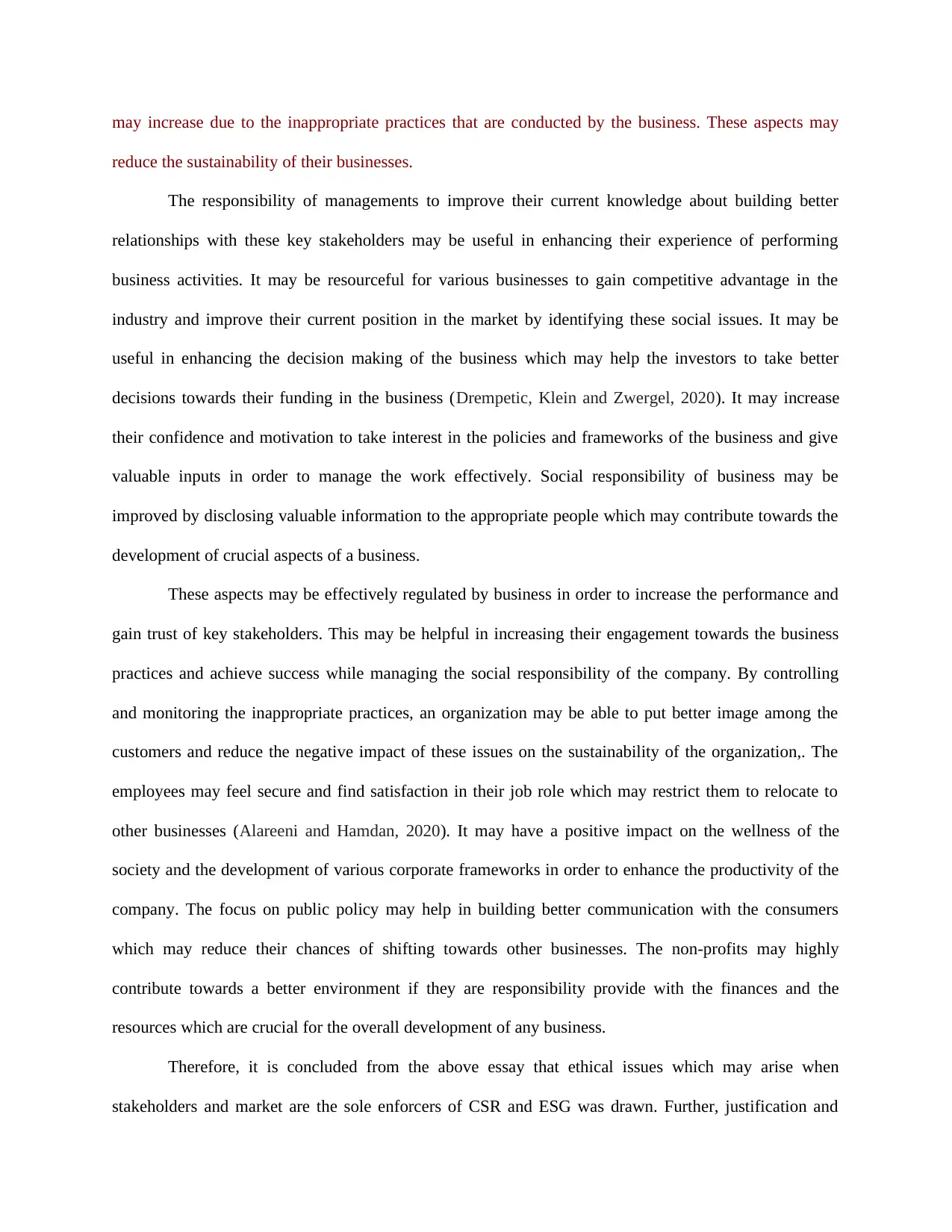
may increase due to the inappropriate practices that are conducted by the business. These aspects may
reduce the sustainability of their businesses.
The responsibility of managements to improve their current knowledge about building better
relationships with these key stakeholders may be useful in enhancing their experience of performing
business activities. It may be resourceful for various businesses to gain competitive advantage in the
industry and improve their current position in the market by identifying these social issues. It may be
useful in enhancing the decision making of the business which may help the investors to take better
decisions towards their funding in the business (Drempetic, Klein and Zwergel, 2020). It may increase
their confidence and motivation to take interest in the policies and frameworks of the business and give
valuable inputs in order to manage the work effectively. Social responsibility of business may be
improved by disclosing valuable information to the appropriate people which may contribute towards the
development of crucial aspects of a business.
These aspects may be effectively regulated by business in order to increase the performance and
gain trust of key stakeholders. This may be helpful in increasing their engagement towards the business
practices and achieve success while managing the social responsibility of the company. By controlling
and monitoring the inappropriate practices, an organization may be able to put better image among the
customers and reduce the negative impact of these issues on the sustainability of the organization,. The
employees may feel secure and find satisfaction in their job role which may restrict them to relocate to
other businesses (Alareeni and Hamdan, 2020). It may have a positive impact on the wellness of the
society and the development of various corporate frameworks in order to enhance the productivity of the
company. The focus on public policy may help in building better communication with the consumers
which may reduce their chances of shifting towards other businesses. The non-profits may highly
contribute towards a better environment if they are responsibility provide with the finances and the
resources which are crucial for the overall development of any business.
Therefore, it is concluded from the above essay that ethical issues which may arise when
stakeholders and market are the sole enforcers of CSR and ESG was drawn. Further, justification and
reduce the sustainability of their businesses.
The responsibility of managements to improve their current knowledge about building better
relationships with these key stakeholders may be useful in enhancing their experience of performing
business activities. It may be resourceful for various businesses to gain competitive advantage in the
industry and improve their current position in the market by identifying these social issues. It may be
useful in enhancing the decision making of the business which may help the investors to take better
decisions towards their funding in the business (Drempetic, Klein and Zwergel, 2020). It may increase
their confidence and motivation to take interest in the policies and frameworks of the business and give
valuable inputs in order to manage the work effectively. Social responsibility of business may be
improved by disclosing valuable information to the appropriate people which may contribute towards the
development of crucial aspects of a business.
These aspects may be effectively regulated by business in order to increase the performance and
gain trust of key stakeholders. This may be helpful in increasing their engagement towards the business
practices and achieve success while managing the social responsibility of the company. By controlling
and monitoring the inappropriate practices, an organization may be able to put better image among the
customers and reduce the negative impact of these issues on the sustainability of the organization,. The
employees may feel secure and find satisfaction in their job role which may restrict them to relocate to
other businesses (Alareeni and Hamdan, 2020). It may have a positive impact on the wellness of the
society and the development of various corporate frameworks in order to enhance the productivity of the
company. The focus on public policy may help in building better communication with the consumers
which may reduce their chances of shifting towards other businesses. The non-profits may highly
contribute towards a better environment if they are responsibility provide with the finances and the
resources which are crucial for the overall development of any business.
Therefore, it is concluded from the above essay that ethical issues which may arise when
stakeholders and market are the sole enforcers of CSR and ESG was drawn. Further, justification and
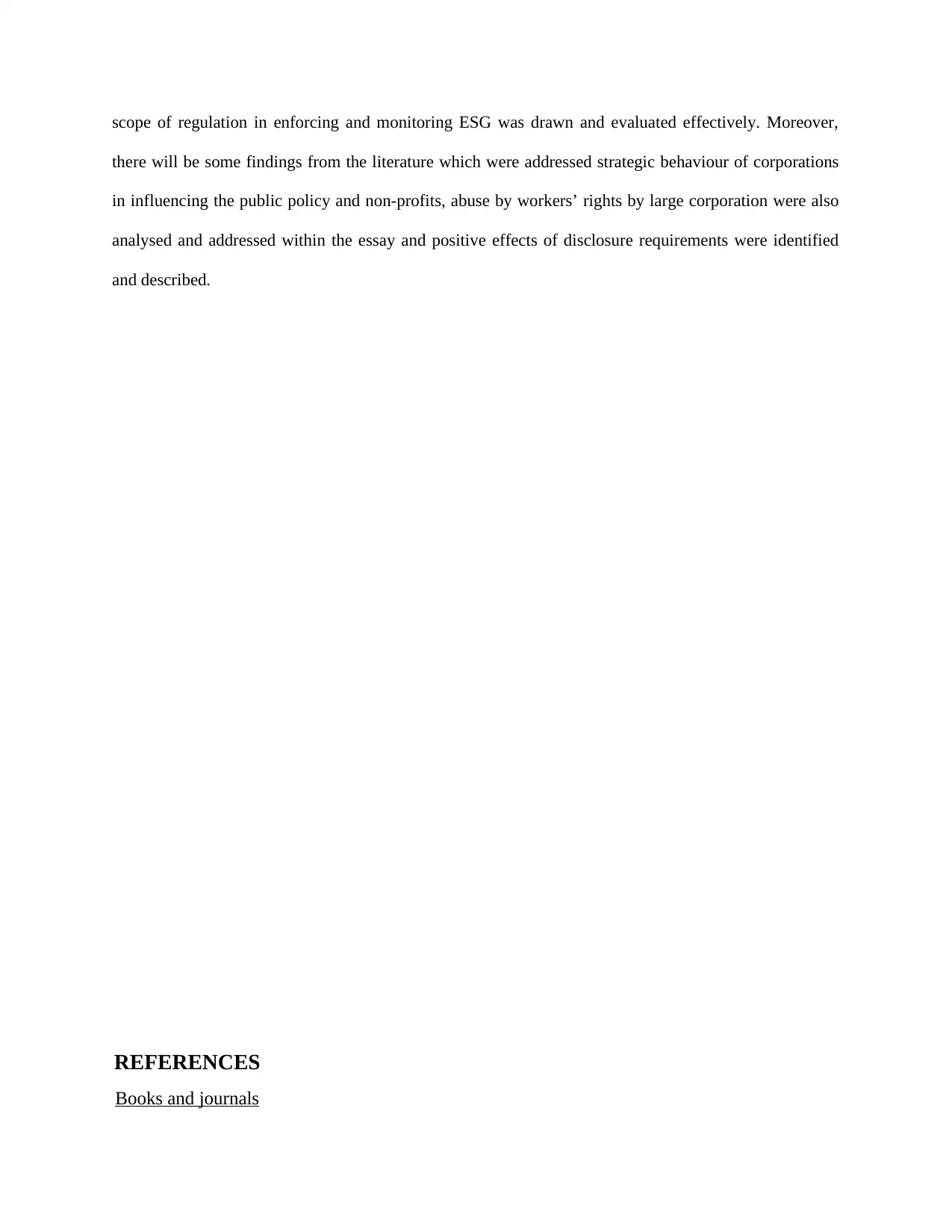
scope of regulation in enforcing and monitoring ESG was drawn and evaluated effectively. Moreover,
there will be some findings from the literature which were addressed strategic behaviour of corporations
in influencing the public policy and non-profits, abuse by workers’ rights by large corporation were also
analysed and addressed within the essay and positive effects of disclosure requirements were identified
and described.
REFERENCES
Books and journals
there will be some findings from the literature which were addressed strategic behaviour of corporations
in influencing the public policy and non-profits, abuse by workers’ rights by large corporation were also
analysed and addressed within the essay and positive effects of disclosure requirements were identified
and described.
REFERENCES
Books and journals
⊘ This is a preview!⊘
Do you want full access?
Subscribe today to unlock all pages.

Trusted by 1+ million students worldwide
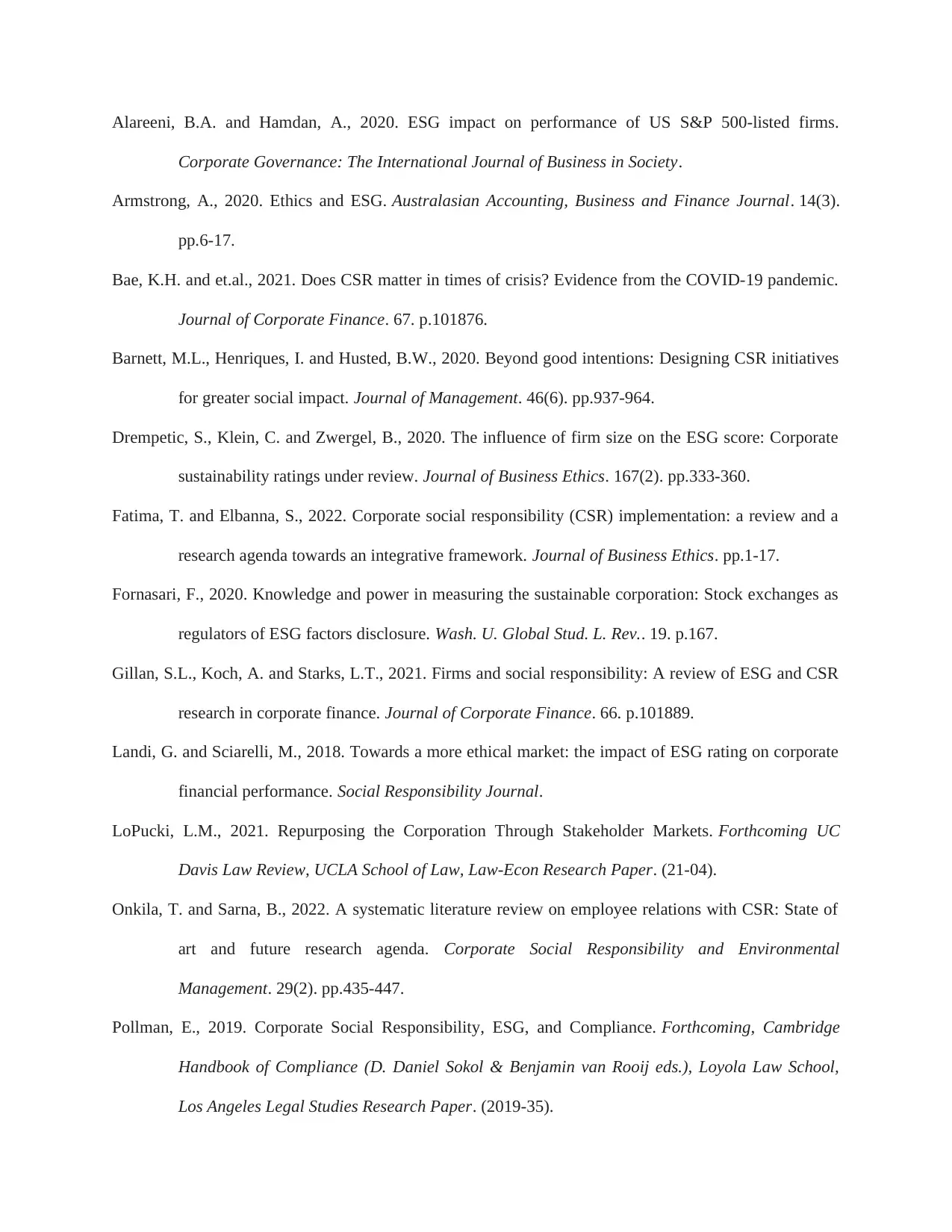
Alareeni, B.A. and Hamdan, A., 2020. ESG impact on performance of US S&P 500-listed firms.
Corporate Governance: The International Journal of Business in Society.
Armstrong, A., 2020. Ethics and ESG. Australasian Accounting, Business and Finance Journal. 14(3).
pp.6-17.
Bae, K.H. and et.al., 2021. Does CSR matter in times of crisis? Evidence from the COVID-19 pandemic.
Journal of Corporate Finance. 67. p.101876.
Barnett, M.L., Henriques, I. and Husted, B.W., 2020. Beyond good intentions: Designing CSR initiatives
for greater social impact. Journal of Management. 46(6). pp.937-964.
Drempetic, S., Klein, C. and Zwergel, B., 2020. The influence of firm size on the ESG score: Corporate
sustainability ratings under review. Journal of Business Ethics. 167(2). pp.333-360.
Fatima, T. and Elbanna, S., 2022. Corporate social responsibility (CSR) implementation: a review and a
research agenda towards an integrative framework. Journal of Business Ethics. pp.1-17.
Fornasari, F., 2020. Knowledge and power in measuring the sustainable corporation: Stock exchanges as
regulators of ESG factors disclosure. Wash. U. Global Stud. L. Rev.. 19. p.167.
Gillan, S.L., Koch, A. and Starks, L.T., 2021. Firms and social responsibility: A review of ESG and CSR
research in corporate finance. Journal of Corporate Finance. 66. p.101889.
Landi, G. and Sciarelli, M., 2018. Towards a more ethical market: the impact of ESG rating on corporate
financial performance. Social Responsibility Journal.
LoPucki, L.M., 2021. Repurposing the Corporation Through Stakeholder Markets. Forthcoming UC
Davis Law Review, UCLA School of Law, Law-Econ Research Paper. (21-04).
Onkila, T. and Sarna, B., 2022. A systematic literature review on employee relations with CSR: State of
art and future research agenda. Corporate Social Responsibility and Environmental
Management. 29(2). pp.435-447.
Pollman, E., 2019. Corporate Social Responsibility, ESG, and Compliance. Forthcoming, Cambridge
Handbook of Compliance (D. Daniel Sokol & Benjamin van Rooij eds.), Loyola Law School,
Los Angeles Legal Studies Research Paper. (2019-35).
Corporate Governance: The International Journal of Business in Society.
Armstrong, A., 2020. Ethics and ESG. Australasian Accounting, Business and Finance Journal. 14(3).
pp.6-17.
Bae, K.H. and et.al., 2021. Does CSR matter in times of crisis? Evidence from the COVID-19 pandemic.
Journal of Corporate Finance. 67. p.101876.
Barnett, M.L., Henriques, I. and Husted, B.W., 2020. Beyond good intentions: Designing CSR initiatives
for greater social impact. Journal of Management. 46(6). pp.937-964.
Drempetic, S., Klein, C. and Zwergel, B., 2020. The influence of firm size on the ESG score: Corporate
sustainability ratings under review. Journal of Business Ethics. 167(2). pp.333-360.
Fatima, T. and Elbanna, S., 2022. Corporate social responsibility (CSR) implementation: a review and a
research agenda towards an integrative framework. Journal of Business Ethics. pp.1-17.
Fornasari, F., 2020. Knowledge and power in measuring the sustainable corporation: Stock exchanges as
regulators of ESG factors disclosure. Wash. U. Global Stud. L. Rev.. 19. p.167.
Gillan, S.L., Koch, A. and Starks, L.T., 2021. Firms and social responsibility: A review of ESG and CSR
research in corporate finance. Journal of Corporate Finance. 66. p.101889.
Landi, G. and Sciarelli, M., 2018. Towards a more ethical market: the impact of ESG rating on corporate
financial performance. Social Responsibility Journal.
LoPucki, L.M., 2021. Repurposing the Corporation Through Stakeholder Markets. Forthcoming UC
Davis Law Review, UCLA School of Law, Law-Econ Research Paper. (21-04).
Onkila, T. and Sarna, B., 2022. A systematic literature review on employee relations with CSR: State of
art and future research agenda. Corporate Social Responsibility and Environmental
Management. 29(2). pp.435-447.
Pollman, E., 2019. Corporate Social Responsibility, ESG, and Compliance. Forthcoming, Cambridge
Handbook of Compliance (D. Daniel Sokol & Benjamin van Rooij eds.), Loyola Law School,
Los Angeles Legal Studies Research Paper. (2019-35).
Paraphrase This Document
Need a fresh take? Get an instant paraphrase of this document with our AI Paraphraser
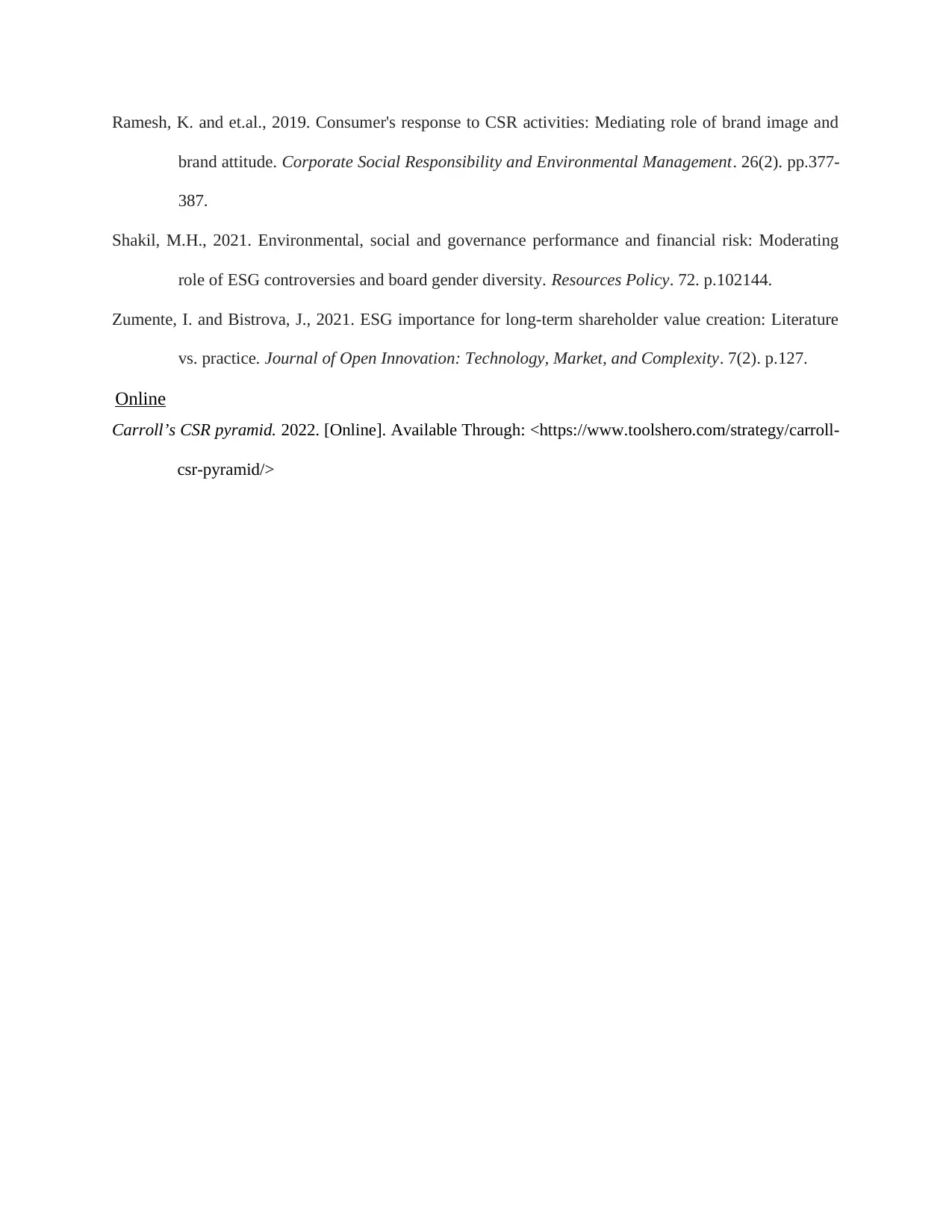
Ramesh, K. and et.al., 2019. Consumer's response to CSR activities: Mediating role of brand image and
brand attitude. Corporate Social Responsibility and Environmental Management. 26(2). pp.377-
387.
Shakil, M.H., 2021. Environmental, social and governance performance and financial risk: Moderating
role of ESG controversies and board gender diversity. Resources Policy. 72. p.102144.
Zumente, I. and Bistrova, J., 2021. ESG importance for long-term shareholder value creation: Literature
vs. practice. Journal of Open Innovation: Technology, Market, and Complexity. 7(2). p.127.
Online
Carroll’s CSR pyramid. 2022. [Online]. Available Through: <https://www.toolshero.com/strategy/carroll-
csr-pyramid/>
brand attitude. Corporate Social Responsibility and Environmental Management. 26(2). pp.377-
387.
Shakil, M.H., 2021. Environmental, social and governance performance and financial risk: Moderating
role of ESG controversies and board gender diversity. Resources Policy. 72. p.102144.
Zumente, I. and Bistrova, J., 2021. ESG importance for long-term shareholder value creation: Literature
vs. practice. Journal of Open Innovation: Technology, Market, and Complexity. 7(2). p.127.
Online
Carroll’s CSR pyramid. 2022. [Online]. Available Through: <https://www.toolshero.com/strategy/carroll-
csr-pyramid/>
1 out of 11
Related Documents
Your All-in-One AI-Powered Toolkit for Academic Success.
+13062052269
info@desklib.com
Available 24*7 on WhatsApp / Email
![[object Object]](/_next/static/media/star-bottom.7253800d.svg)
Unlock your academic potential
Copyright © 2020–2026 A2Z Services. All Rights Reserved. Developed and managed by ZUCOL.





